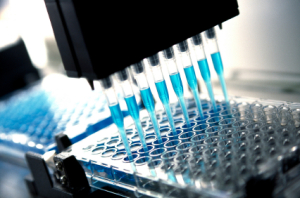Vaccine prevents breast cancer in mice, organizations remain wary
by
Heather Mayer, DOTmed News Reporter | June 08, 2010

Early progress on
breast cancer vaccine
Following the model of preventive vaccines for childhood diseases, a team of researchers from the Cleveland Clinic's Lerner Research Institute has created a vaccine that was successful in preventing breast cancer development in mice. The findings were published in the online issue of Nature Medicine last week and will appear in the June 30 print issue of the publication.
Vince Tuohy, principal investigator and professor at the Cleveland Clinic Lerner College of Medicine says he solved a big problem.
"The big problem was to create a powerful vaccine against self and the tumor but ignore the normal tissue," he says.
To do this, Tuohy and his team pursued cancer as they would pursue any childhood disease, like measles or polio. But unlike those diseases that are prevented by normal vaccines, cancer is not typically caused by a virus. So instead of targeting a virus, the researchers turned their attention to α-lactalbumin, a protein found in the majority of breast cancers but not in healthy women, except during lactation.
The vaccine essentially works by increasing the number of immune cells that fight against the development of tumors, explains Tuohy. The vaccine was tested on mice that were both normal and those that had a genetic predisposition to breast cancer, which is also a risk factor in some women.
At two months, the mice were given the vaccine, and at 10 months the researchers examined whether the mice had tumors. The mice predisposed to breast cancer that were given the sham, or placebo, vaccine developed tumors in 100 percent of the cases, while those predisposed mice that were administered the real vaccine did not develop tumors in 100 percent of the cases.
"If a tumor does manifest, the immune cells nip it in the bud immediately and remove it," explains Tuohy, comparing the way the vaccine works to police cars that patrol the streets taking down crime.
The researchers also looked at whether the vaccine could be used therapeutically by fighting existing tumors, similarly to the prostate cancer vaccine and the experimental brain cancer vaccine [see DM 12673].
The vaccine "is very good at attacking established tumors," says Tuohy.
In terms of side effects, the researchers note only breast inflammation due to the α-lactalbumin target, which can interfere with nursing. Tuohy points out that the vaccine is really designed for women older than 40.
In all of the mice there was no effect on fertility. They were able to give birth but had trouble breast feeding.
